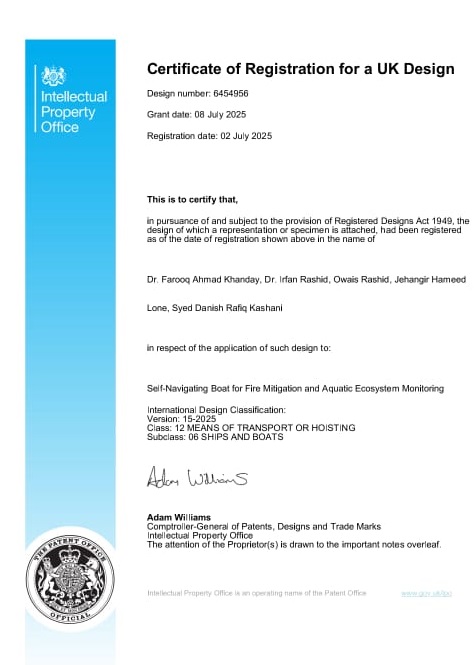Srinagar, July 17: In a major technological breakthrough from the Kashmir Valley, a group of scientists from the University of Kashmir has developed a solar-powered, self-navigating boat to tackle fire outbreaks in Srinagar’s houseboats and deteriorating water quality in Dal Lake.
What makes this innovation particularly noteworthy is that its design has been officially registered with the United Kingdom’s Intellectual Property Office (UKIPO) under Registration No. 6454956 granting it legal protection and international recognition under UK design law.
Over the past five years, dozens of houseboats have been gutted in major fires in Dal and Nigeen Lakes, including one blaze in March 2024 that destroyed four houseboats near the Ghat No. 15 area, leaving several families homeless.“Firefighters often struggle to reach the core areas of the lake quickly, especially during winters when water levels drop and access becomes limited,” said a senior official from the Fire and Emergency Services Department, not authorised to speak on record.
The innovation is seen as a potential asset for multiple stakeholders from emergency services and lake conservation bodies to urban planners and disaster management authorities.Local houseboat owners, often the first to bear the brunt of fire hazards, expressed cautious optimism.“We have lost too many houseboats over the years, and very little has been done in terms of preparedness,” said Ghulam Nabi Bhat, a third-generation houseboat owner near Nehru Park.
“If this invention can really help control fires faster, it should be deployed here as a pilot.”Another resident, Nusrat Ahmad, who lost his family’s houseboat in a blaze in 2022, recalled how help arrived nearly 45 minutes after the fire broke out. “There was just smoke and charred wood by the time they reached. This kind of boat could have made all the difference,” he said.
The design, officially classified under Class 12 “Means of Transport or Hoisting” and Subclass 06 “Ships and Boats,” also represents a shift toward green technology in the region, as the boat runs entirely on solar energy. It is built for daily operations with minimal maintenance and no fuel emissions.
Experts believe this development could also open doors for local startups and research institutions to collaborate on scalable technologies for environmental monitoring and disaster response.“








